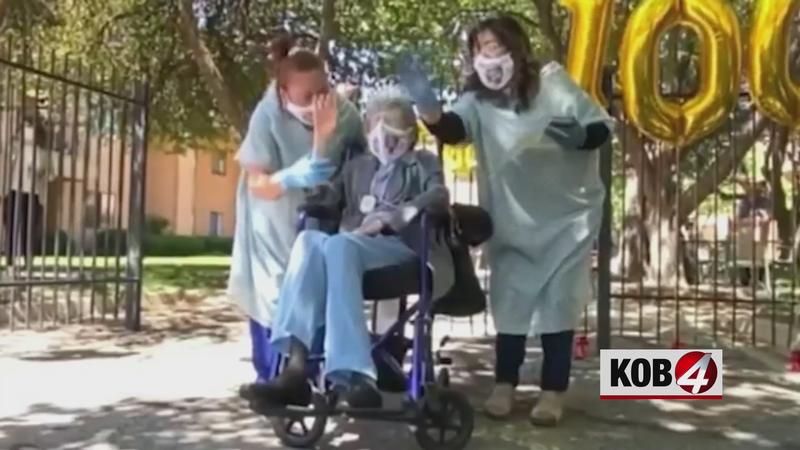One Year Later: How COVID-19 has impacted New Mexico seniors
[anvplayer video=”5012237″ station=”998127″]
ALBUQUERQUE, N.M. — Those who loved Jeanne Leavitt describe her as a spry older lady.
“She was a single mom,” said Charlotte Roybal, Leavitt’s daughter. “Managed to earn a living and get a degree and get a pension from the state of New Jersey.
At 89, she moved to New Mexico to be closer to family.
“Her mother had lived to 102,” explained Roybal. “So it was so important for her to make it to 100.”
Leavitt did make it to 100, reaching the major milestone in the middle of a pandemic.
Instead of a celebration at her home, the community held a birthday parade.
"It sure is a different kind of birthday party, but we’re sure enjoying it,” Roybal said.
Leavitt wasn’t the only senior to enjoy a surprise like this. All across the state, New Mexicans rallied around our seniors from a distance—often through a window or from a balcony, trying to make the most of a tough situation.
“Before the pandemic,” explained Loreyna Ojeda, Leavitt’s granddaughter, “We would see her at least once a week, if not more."
But everything changed when the pandemic hit in March.
“The week prior to COVID coming to New Mexico, you could see the states around a start turning red,” said Aging and Long-Term Services Sec. Katrina Hotrum-Lopez. “I said this is only going to be a moment until we get this.”
There wasn’t a lot of information about how the virus spread. Once there were confirmed cases, “food started flying off the shelves,” said Sec. Hotrum-Lopez.
“She was anxious because she kept hearing the shelves were empty,” remembered Ojeda.
“Instantly, we started receiving desperation calls from the community saying, ‘We don’t have access to food,’" said Sec. Hotrum-Lopez. “’I’m a senior. I went to the grocery store. I couldn’t buy anything.’"
Long-term care facilities were the first to go on lockdown.
“We had staff so scared that they would walk off the job,” said Sec. Hotrum-Lopez.
The Aging and Long-term Services Department had to recruit more workers, get more PPE, testing equipment, food and supplies to seniors—all while outbreaks at nursing homes were multiplying across the state.
“I remember the call that I got from one of the administrators who said, ‘We’re doing everything that you’ve asked us to do. We’ve gone above and beyond. My staff are tired. We’re tired. Is this going to end? We don’t know how it’s getting in. We don’t know what to even do anymore,’” explained Sec. Hotrum-Lopez.
Still, they kept trying.
Early on, some seniors had to move out of their homes to make room for a COVID facility.
“If hospitals, who were going to fill up really quickly needed to transfer people out, we needed a place for them to go,” explained Sec. Hotrum-Lopez.
While the outside world kept changing, those stuck inside felt lonelier.
“There were times where she was angry we had to visit her from the balcony,” explained Ojeda. “She didn’t really understand the pandemic.”
“We had to really start addressing the isolation that happens with seniors in general, and definitely for this population, and we were terrified for them,” said Sec. Hotrum-Lopez.
But just like those parades, the community showed up.
Some volunteered, others donated tablets, and many others took part in socially distanced celebrations.
“We were able to partner with private business, and with also the nursing home industry, and we were able to deliver tablets to every single long term care facilities,” said Sec. Hotrum-Lopez.
New Mexicans of all ages wrote letters of encouragement. Volunteers helped the state deliver almost five million meals to low income homebound seniors and disabled adults across the state.
“It’s interesting to see how quickly we unite when we know that it’s about saving the lives of a senior in New Mexico,” Sec. Hotrum-Lopez remembered. “It’s amazing to me.”
Eventually, more testing, rapid responses, and now the vaccine have helped reduce transmission.
“No decision is made lightly and no decision is made easily, and it’s a burden,” said Sec. Hotrum-Lopez. “But it’s something that we’re proud of now.”
The state has no doubt—lives were saved.
“We believe that one death from COVID is too many,” said Sec. Hotrum-Lopez.
One year later, more than 2,600 seniors have died from COVID. Many others died of old age without family by their side.
“She was not marked as a COVID death,” said Ojeda. “So I appreciate the safety measures that were taken that she was safe, and she passed naturally.”
Looking back, there was a silver lining.
“She was very happy that day,” said Roybal of her mother on the day of her 100th birthday parade. “That was the one thing that she did remember before she passed away.”
They’re asking everyone to keep following COVID safe practices and wear masks so that more families can come together when the virus is under control.
